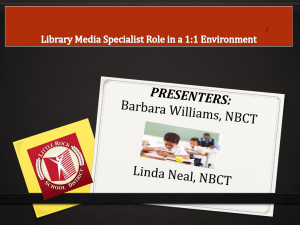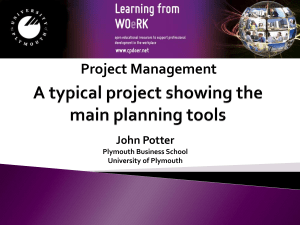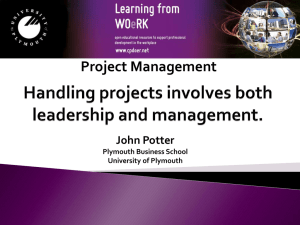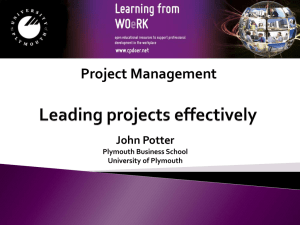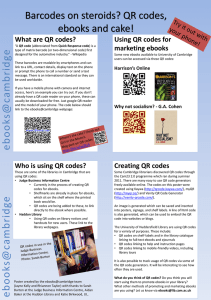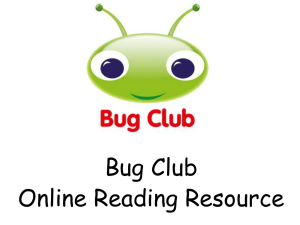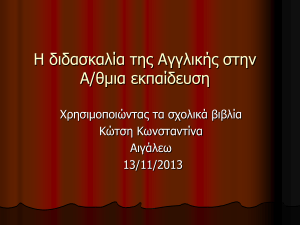APS-eBook-Talk-080313v1_1330
advertisement
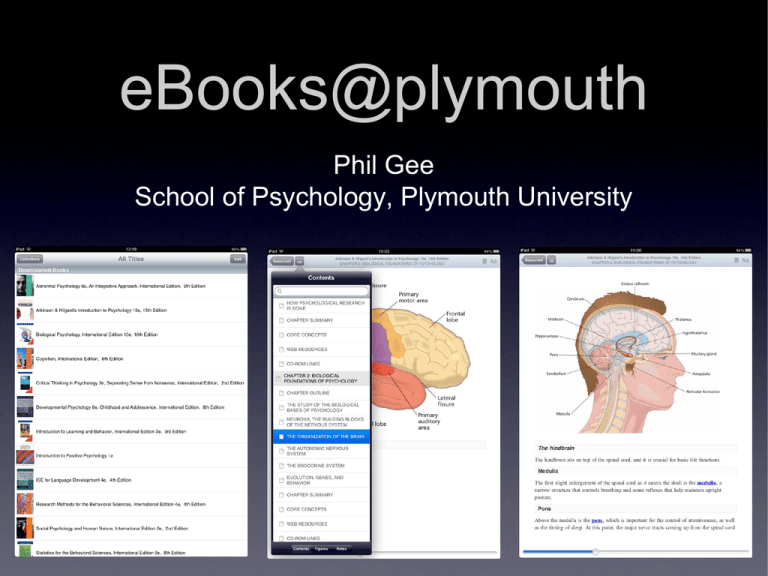
eBooks@plymouth Phil Gee School of Psychology, Plymouth University I cannot begin to tell you how happy this makes me! At 27 I am no longer prone to jumping up and down with excitement, but this made me want to jump out of my seat and make silly girly noises! the idea • Textbooks are splendid things • Let’s get students using them • I choose & provide • Customer is school, not student. eBooks in Psychology • Stage1 deal in 2011:12 Cengage texts cover all core lectures • Spans 4 intakes (360 + 320 +320 + 320) plus 40 staff. eBooks in Psychology • Stage 2 deal in 2012:11texts covering all core lectures • Pearson, Wiley, Sage, Palgrave & Cengage • Spans 3 intakes (370 + 340 + 340) plus 40 staff. benefits • Delighted students & parents (print copies £900+) • Teach knowing ALL students can access reading (anywhere) • Note sharing - social and dynamic. benefits • level playing field • frees up library resources • encourages ‘reading for a degree’. works well because • books ‘belong’ to student • anywhere, any time • reliable platform. survey Eighty-six first-year Psychology undergraduates at Plymouth University responded any positive comments? any negative comments? The ebook scheme is fabulous! Aside from the huge amount of money it saved me, the ebooks are so much more accessible than the hard copies. Just the fact I can carry twelve textbooks round with on my phone and iPad... I can read during the commute the uni and even whilst Im cuing to pay for my groceries. Similarly the search facilities are so much more effective, book marking and highlighting and especially being able to see what and where your peers have highlighted their copies. Ive never used ebooks before and in all honesty I typically find reading a bit of a chore, but having the ebooks really has made a world of difference. Thank you! survey Eighty-six first-year Psychology undergraduates at Plymouth University responded any positive comments? any negative comments? Puts everyone at an advantage right from the beginning of the course and not only the people who can afford books. saves waiting in an endless waiting list for a book. easily accessed and portable. its harder to read alot on a computer screen i feel it strains my eyes more than a paper book survey Eighty-six first-year Psychology undergraduates at Plymouth University responded any positive comments? I like the on line tutorials on the e books they help me. Also I prefer to read e books in bed as I can make the print bigger and I dont drop it on my chihuihua dog, like i do with normal books. any negative comments? i found it odd reading books from a I do prefer the printed books but want to get more used to the e books. Also they are really good for the environment. computer screen but soon got used to it 2012 project • Second Year Psychology • Environmental Science • Marine Biology • Earth Sciences • Computing • Geography. 2012 project Sage Pearson Hodder Cengage McGraw Hill Taylor & Francis Prentice Hall Wiley Blackwell Palgrave Macmillan. survey Five hundred and four undergraduates at Plymouth University responded print I prefer studying from 29% combina eBooks -tion 10% 61%. survey Five hundred and four undergraduates at Plymouth University responded yes no Have you bought any of the books in the bundle in print form? 15% 85% Did you buy books on the supplementary reading lists? 31% 69%. survey One hundred and one second and third year students surveyed post exam or online. Mean (standard deviation) How many books did you buy in your first year? Total New New New Second (shop) (online) Hand 3.63 (2.46) 2.49 (1.98) 1.04 (1.64) Mean price on Amazon = £31.83 (£13.27) 0.80 (1.37) good for publisher • much more predictable • multi-year deal cost and market advantages • universities less likely to pirate their stuff good for universities • we can do our job more effectively • we have happy students lessons I: working with academics • herding cats would be easier • decision: which available texts suitable? • commit to several years? • email won’t do • need to start early. lessons I: working with academics committee = slow death. lessons II: working with publishers • like herding poorly-trained cats • variation in pricing policy • not always easy to get the idea across • unit = book. lessons III: working together • we need a Jess and a Jeni, plus clear and attractive pricing policies • or publishers need to develop offers: work with universities and/or distributors. final thoughts • really exciting time in academic publishing • we could get quality texts to students when & wherever wanted and build habitual reading • but must build new relationships & new ways of thinking about content. ...
